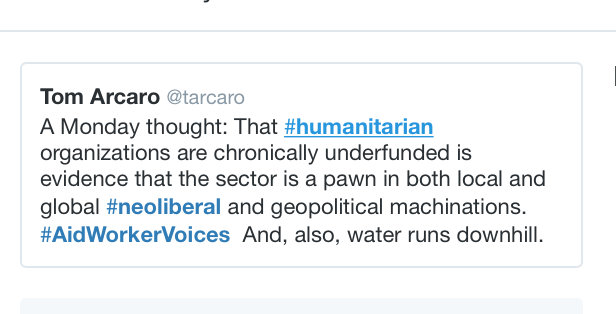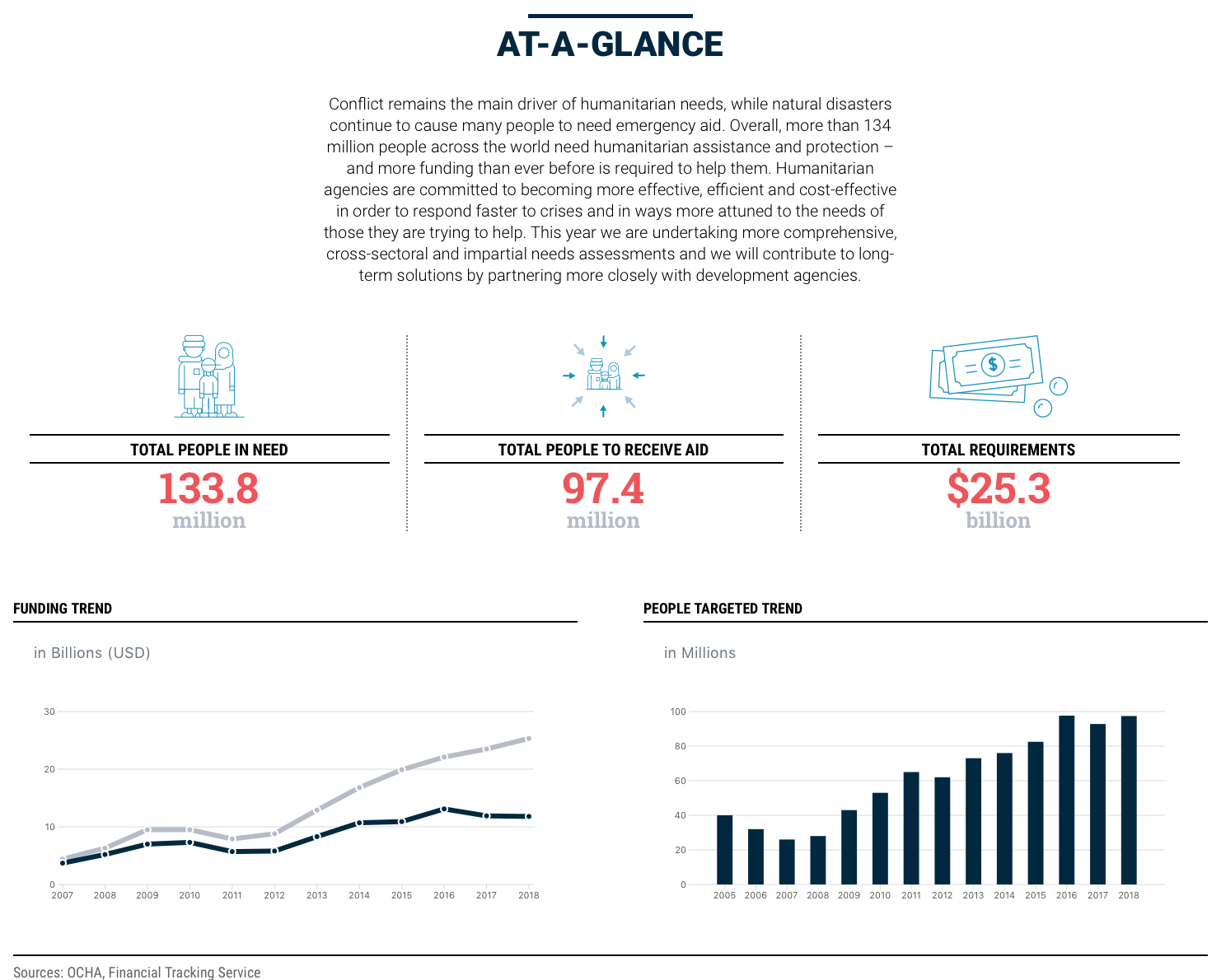 The context
The context
Stepping back from time to time is very useful for gaining perspective.
Studying the humanitarian sector can draw you into any number of topics, and just keeping up with the latest controversies, Tweet threads, ‘Fifty Shades of Aid‘ Facebook posts, informational web sites, academic journals, and blogs like Aidnography is more than enough to keep this researcher occupied. But being ‘drawn in’ means making it harder -and thus more necessary- to step back occasionally.
And so I have, enjoying a short but intense conversation with a respected silverback in the sector, my colleague J (aka Evil Genius). One comment he made struck me, and I decided to explore further.
sector, my colleague J (aka Evil Genius). One comment he made struck me, and I decided to explore further.
We were discussing many topics including my research on national humanitarian workers, critiques of the sector, and the trope ‘moving the needle.” J and I agreed that there is both a great deal wrong…and a great deal amazingly ‘right’ with the sector and, given the time, evidence of both extremes can be found, documented, and discussed ad nauseam.
Among many other nuggets, J offered, “In the big picture the sector is but a pawn in terms of international politics.”
Yup.
 According to the Global Humanitarian Assistance report, $25.3 billion was needed in 2017 for all humanitarian efforts, of which less than half -only 47%- was funded. This $12 billion allowed humanitarian organizations be help only 97 million of the 134 million IDPs, refugees, and, in the case of Iraq, ‘remainees’ in need.
According to the Global Humanitarian Assistance report, $25.3 billion was needed in 2017 for all humanitarian efforts, of which less than half -only 47%- was funded. This $12 billion allowed humanitarian organizations be help only 97 million of the 134 million IDPs, refugees, and, in the case of Iraq, ‘remainees’ in need.
Important to stress is that the vast majority these funds went to human-made disasters -a sterile euphemism for wars- , not natural disasters like typhoons or earthquakes
Compared to what?
$12 billion sounds like a lot of money, but that clearly depends on context. For the sake of comparison,
- Apple Corporation posted quarterly revenue of $52.6 billion in 2017, making for $210.4 billion total. That’s a lot of iPhones, MacBookPros, and smart watches.
- In the US alone, over $35 billion was spent combined on elective surgery ($16 billion) and Valentine’s Day ($19.6 billion) in 2017. Tummy tucks and breast implants are not cheap.
- US military spending in 2017 was $610 billion- over 51 times that spent by the entire globe on humanitarian assistance.
 Nearly $600 billion was sent in remittances -funds sent by migrants to relatives in their home countries- in 2017. This last remittance number is critical. $24.5 million was used in Haiti by the humanitarian sector and $1.43 billion was send from the Haitian diaspora located in the US alone.
Nearly $600 billion was sent in remittances -funds sent by migrants to relatives in their home countries- in 2017. This last remittance number is critical. $24.5 million was used in Haiti by the humanitarian sector and $1.43 billion was send from the Haitian diaspora located in the US alone.- Epic games is making at least $3.6 billion per year from their online game Fortnight.
- And, finally, a comparison pointed out by J himself: the financial size of the aid sector and the porn industry are about the same …the porn industry makes about $15 billion per year, just a bit more than the $12 billion in humanitarian aid.
My point is this: the money spent on global humanitarian response is, comparatively, a pittance, literally.
A Martian’s view
What I find interesting is looking at this from a total outsider’s perspective, say, a Martian’s. “How is it with so much human misery so little money (comparatively) is devoted to helping humans in need, especially when there is obviously wealth being used for patently non-essential purposes?”, they might ask. And further, “Your actions and priorities indicate that you value your own life far more than the lives of others, but your world religions and major ‘humanitarian’ documents seem to emphasize that all humans have equal value. How do to reconcile that disparity?”
Indeed, I have been asked these kinds of questions by villagers in rural Chiapas, Mexico and elsewhere in my travels in the Global South. I have found no satisfactory response to the Martian or to those humans I’ve met.
Back to the point about being a pawn
I think the above add at least indirect support to J’s point that ‘the sector is but a pawn in terms of international politics’. If we -collectively as humanity- really wanted to recognize the “inherent dignity and of the equal and inalienable rights of all members of the human family” we could. As seen by the numbers above, it appears to be a matter of priorities. Those in power choose to worship whatever economic and political systems keep them in power, and for many that god is ‘freedom’ under the guide of neoliberalism. (Details on that for another post.)
Let me expand with one example. Yemen, according to the UN Secretary General, is the worst humanitarian crisis of 2018. The 22 million Yemeni in desperate need are pawns in geopolitical machinations at the highest levels.
Could it be possible that Saudi Arabia or the United States could end the war in Yemen if either wanted to? Cynically, I’ll respond with, ‘of course.’ Yes, the situation in the Gulf states is very complicated. Yes, there is much history to consider and numerous cultural and religious factors in play. But in the end, it can be argued, that in Yemen, just like in Biafra all of those years ago (with countless examples in between) that humanitarian aid is merely a pawn pushed across the global chess board by those jostling for power.
Another example, with an even longer and perhaps even more distressing history, is humanitarian aid being used as a political tool in Palestine, particularly by those in power in the US.
Perhaps the discussion should not be about what is ‘right’ or ‘wrong’ with the sector or how to ‘remake aid’ but rather how to change the macro level forces that have an interest in keeping a good part of the human family marginalized.
And yes, I realize I point this out perched in ‘an ivory tower’
As always, comments, questions, and snark can be directed here.


 Follow
Follow